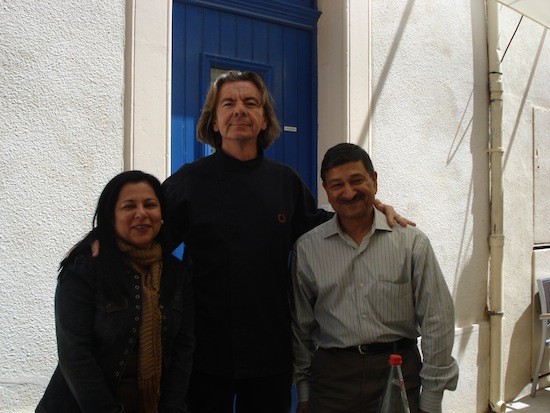
Every Monday, Clay Oven Irvine executive chef/owner Geeta Bansal
shares an interview that she's done with some of the heavyweights of
European cooking. Today, she regales us with a visit with Jean-Luc Rabane. Enjoy!
]
The Gypsy King of Cuisine in Provence, Jean-Luc Rabanel
By Geeta Bansal, Executive Chef-Owner Clay Oven Irvine

There is no better way to describe this extremely talented, animated, excitable chef than to call him the gypsy king of the cuisine of Provence (incidentally the group Gypsy Kings are from Arles and Montpelier nearby). For me a trip to the area is incomplete without visiting the L'Atelier du Rabanel on rue Carme, Arles, France. Jean-Luc Rabanel has been cooking since 1995. I first met him at La Chassagnette in the Camargue, the marshy backlands in Provence which my husband refers to as the boonies since he is the designated driver to every trip to the gardens there which I love. It is a dreamy backland with pink flamingos, wild horses, birds, and an ephemeral mist that gives it an unreal quality. Not the best place to get lost at night since there are no visible lights or signs of habitation. During his time at La Chassagnette chef Rabanel was the first chef to introduce the bio (organic) cuisine in a restaurant menu in the region.
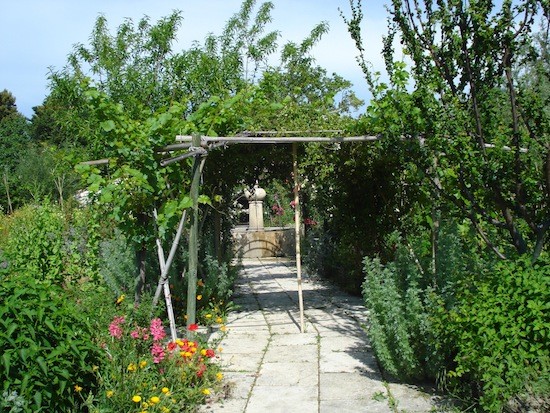
A visit to the glorious gardens of La Chassagnette explained the connection between what the chef was showcasing on his menu and his organic leanings. He earned a Michelin star during his tenure there and has been followed by a young chef who trained at Ducasse in Monaco. In 2006 chef Rabanel moved from the remote Camargue into the historic centre of Arles to open his own restaurant. He still maintains his own gardens in the Camargue for his present operations.
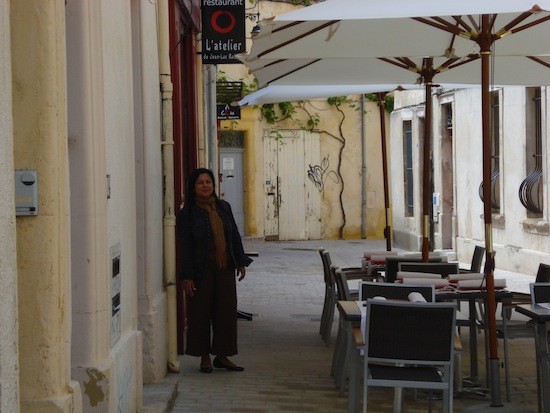
He quickly got his first macaron (star) Michelin in the spring of 2007. Very soon in 2008 he was recognized by the Gault et Millau guide as the 'Chef de l'annee' for 2008. That same year he opened a small bistro 'A Cote ' adjacent to the restaurant. That year I visited him and he spoke about opening a small auberge and offering cooking classes there. Recognition comes to him in pairs as in 2009 his second star arrived and then he obtained the Chevalier des Arts et des Lettres in October of the same year. Last year he was recognized by Gault et Millau as one of 16 most prestigious tables in France. He has written two books, one of them a retrospective.
For me his cuisine evokes the essence of Provence. He develops his seasonal menus based on a concept of emotions. He says pleasure in food is indispensable yet insufficient by itself. He tries to showcase a different emotion on each plate and on his tasting menu he tries to lead into a different emotion by each mouthful taking the diner into another emotion by surprise or sometimes gradually (it sounds better when he explains it with his voluble gestures and speech). Actually each bite announces what is to follow next as the notes are a prelude for the next surprise and taste. The fifteen courses take you on this journey that like a roller coaster ride you don't know what's coming next. Chef Rabanel is always around to watch the effect of his production on the faces of his diners. This restless chef takes you to an alternate universe of food with his expertly executed dishes with a lot of emphasis on seasonal produce.
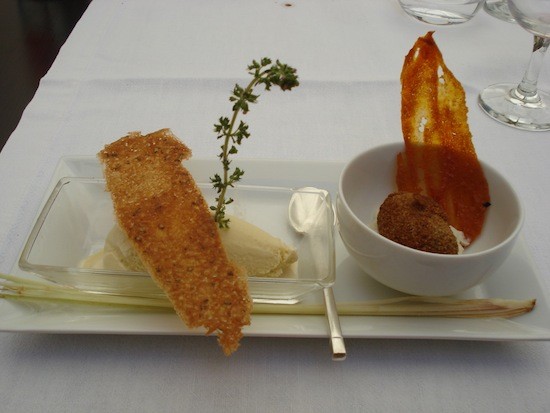
The restaurant is diminutive, decorated with red and black accents and chrome and leather chairs. If the weather is nice then the outside seating on the patio (which is actually the street that the restaurant is located on) is perfect. The restaurant has since expanded to two dining rooms with a small area for aperitifs. The menu could be based around tomatoes in summer or fresh sardines in another. In some way his joy in his cooking is very easy to imbibe along with his amazing food. I associate happy moments with him and his cuisine. He can be quite dramatic at times and one visit can be a theatrical performance while another is his most engaging professional chef persona.
One time while taking a picture with him he had us bend down (he is about the same height as me) since he said “I am the greatest chef in the world and I have to be taller than everyone” (his Napoleonic humor, I guess). I always come home inspired to use herbs and produce from my gardens in a nouvelle form. Whether you are inspired to cook or try new things or not you are sure to leave laughing over his conversations and antics. In this historic city there are many signs leading to the L'Atelier du Jean-Luc Rabanel and the rue des Carmes that is now rue de gastronomy of the area. If the happiest place (sic) on earth is Disneyland then he is certainly the happiest chef of that part of the world!
Questions for chef Rabanel (he speaks French and I have translated literally to maintain the verity of his responses)
How do you define your cuisine?
For me, the kitchen is a living kitchen that makes the most of the diversity of the
plant world. My philosophy is to create and prepare healthy food. Life as it
continues to evolve, adapt and change is what it's about.
You use mainly organic or bio products. When did you start cooking this
way?
Kitchen Life is the culmination of my current approach to cooking conceptualized in my “Atelier” since 2006.This is the natural consequence of my approach to cook, obviously led me to offer vegetables leading roles in my creations.
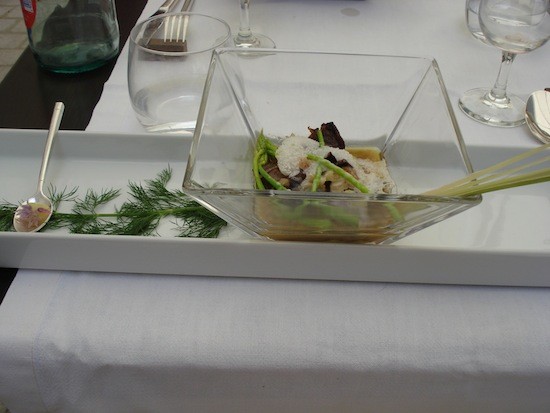
I first enjoyed your cuisine at La Chassagnette and since at your Ateliar in Arles. What changed in your style of cuisine when you opened your present location?
I do not see the kitchen as an exercise in reproduction but as a permanent opportunity for new creations and renewal at the same time. With my team, we love novelty, we value innovation, and we are looking for the unexpected. I wanted to create a different place, an intimate, simple, elegant and welcoming. Where people are coming to relax and enjoy dining.
Where does your product come from? Local farmers or your own gardens?
Local farmers for the most part, as we have the best produce around.
Are health benefits of your way of cooking more with vegetables and seasonal products a factor in your cooking style?
My cuisine is dominated by the plants which plays with fruits and flowers, forget the fat and sugar for homemade condiments. Dietetics and gastronomy meeting in the middle.
I am totally against the idea that eating organic food equals a sad experience as some might suggest especially “bio fundamentalists.” The body needs to eat healthily and eating should be in the spirit of rejoicing. I'm not eating only hard seeds or tofu, if I use sprouts, then they cooked and they will always be associated with other flavors. I think the bio can enjoy a huge number of varieties of vegetables, which can never be limited. With the bio, we will always seek to further the flavors that we lack. We can achieve countless associations with vegetables because there are an impressive number of variations. For example you can find 42 different varieties of artichoke and 24 kinds of basil!
By cultivating organic vegetables, we get the most extraordinary that can exist. The kitchen becomes a breeze, a real rubikub! (rubic cube). You put flavors together like solving a puzzle.
You live in Provence in the most beautiful part of France. What are some
other areas of France that you like?
Southwest, where I come from!
Are you influenced by other cultures in your cooking?
I am inspired by all cuisines, all cultures.
Which chef has influenced your cooking style the most?
Michel Bras, Pierre Gagnaire and many more…
What is your favorite season in Provence?
Spring and Summer are my favorite seasons.
[
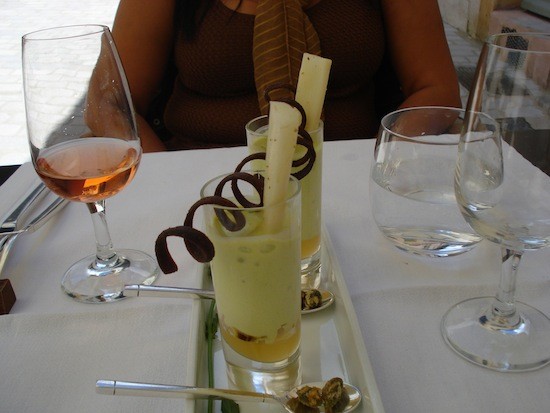
What meals from your childhood are memorable for you?
The bread toasted in the fireplace grate, just milked fresh milk and allowed to warm, fine notes and varied garden vegetables fresh and crisp .
Every time I visit I am astounded at how you create your menu around a particular product. What inspires your menu everyday?
A product, smell, mood.
What part does humor and whimsy play in your creations?
100% (you have to see him in action to get that).
What reaction are you looking from diners? Is it important to you how they
react?
Pleasure is a prerequisite necessary but it is not enough. We want to go beyond each and provoke a series of shocks and surprises that intense as well as ephemeral. Each dish should be an emotion. The introduction of that taste in his (the diner's) last mouthful must plunge the taster in the register of discovery. This
discovery we want to renew more than fifteen times per meal. We want to read on faces the impact of our productions: joy, surprise, surprise, excitement, amusement, jubilation, or perplexity.
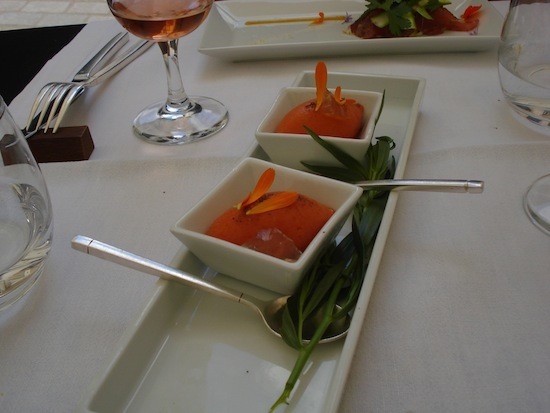
What makes you happy? I always see you having fun while working and that
makes me happy!
Life!
What do you think every visitor to Arles must see other than visiting you?
Arenas of Arles, the historic center and its market, one of the most beautiful Provence. (I thought he was going to say himself)
What is your favorite food from your part of Provence?
The variety of fruits and vegetables that the sun of Provence has to offer are many and varied, this is the real treasure for us.
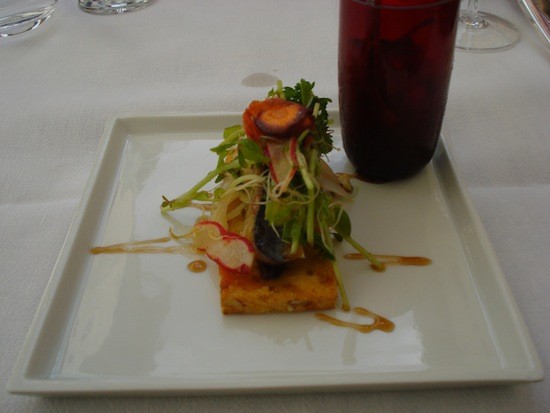
What kind of music do you like and who is your favorite artist?
Johnny Hallyday and Gipsy Music (Chico and the Gypsies)
What advice would you give a young cook?
Patience and passion. Curiosity and intelligence.
Do you offer cooks a chance to do stages or train with you?
Yes I do, of course.
Do you have a rule that you live your life by?
Keep smiling and cheerful no matter what.
Which is the worst vacation you have ever taken and why?
I do not take vacation, so I'm not disappointed … (Smile)
What is your favorite food in the world?
Pasta may be…
How about opening a restaurant in California? Would you think about it?
No, I think I could not live without my Provence… (He was saying are you kidding, like I would ever leave this heaven on Earth)
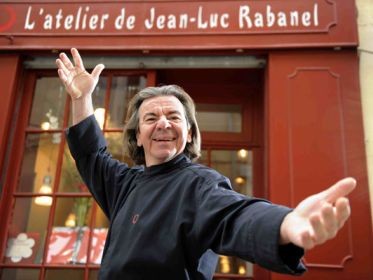
If you are in the area, stop by and eat a meal and meet this most creative chef. His food and conversation will put a smile on your face!
Follow Stick a Fork In It on Twitter @ocweeklyfood or on Facebook! And don't forget to download our free Best Of App here!


One Reply to “Geeta Bansal Interviews Jean-Luc Rabanel, the Gypsy King of Cuisine in Provence”